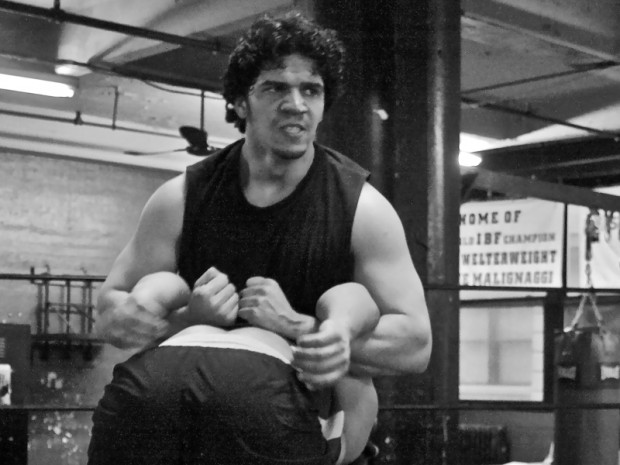
In his daydreams, Santiago thinks about new moves to try out in the ring – reaching back to matches he saw on TV as a child, hoping to put twists on old favorites. He also auditions catchphrases in his mind and finds himself gravitating to the bathroom mirror to spout them aloud, complete with matching facial expressions ranging from evil grins to feigned shock. He’s striving to develop a character who can connect with fans.
Silvestri’s character didn’t draw big with the WWE audience, but it is an inextricable part of him. “Call me Ki,†he replies when someone addresses him as Mr. Silvestri. Schnurr works part-time as a bartender and the customers call him “Scotty Mac.†Most of them, Schnurr said, don’t know his real name. Even on the schedule behind the bar, he’s listed as “Scotty Mac.â€
“I’ve struggled with it,†he said. “I am somewhat similar to my wrestling character outside the ring and it hasn’t been the most positive thing for my personal life. But that’s the way it’s gone. It’s what makes me happy. The wrestling world is a lot more fun than the real world.â€
As he strives to find his place in the wrestling arena, Santiago is determined to keep one booted foot planted in the real world and not get swept away by a ring persona. “I see guys who just start training and they want to be called by their character’s names,†Santiago said. “They are complete marks for themselves. I’m just George. Some people call me ‘Santi’ in the gym and that’s fine, but I’ll always be George.â€
It’s not easy being just George in a world that spins on embellishment and artifice. Promoters lie about their performers’ heights, weight – even the size of ladders they jump off. Wrestlers are taught to take their own character traits and blow them out of proportion, inside and outside the ring. The fans arrive at arenas or turn on their TVs with outsized expectations.
“It’s a part of the spectacle,†said Schnurr. “When people know it’s staged, you do different things to try and maintain that suspension of disbelief. Sometimes we even say there are more people in the arena than there really are.”
Many pro wrestlers get lost in the hype they help create. They are essentially fans who have dedicated themselves to the craft. At the start of every episode of WWE’s Monday Night Raw, announcer Michael Cole declares the show is television’s longest-running episodic program. Pro wrestlers don’t see that. They see a battle of good and evil, a gladiatorial contest that will be remembered for decades by thousands of spectators – even if the ending is predetermined.
“I think every pro wrestler has to make the decision if they are going to do this for their own enjoyment or to make a living,” Schnurr said. “It was something I wasn’t conscious of early on and you get to the point where you see this as a business and you begin to see things differently.”
Most professional wrestlers aren’t in love with the business, but adore the rush they get in the ring. The child who gets hooked on the living room couch never leaves. He’s always there. He cheers every Front-Face Lock and Abdominal Stretch and leaps from the couch, arms raised in victory, with every three-count.
“It’s hard at first because you’re just so happy to be doing it,” Santiago said. “But after a while, you realize that it’s entertainment. It’s an illusion. We work very hard to make people happy and we have goals. But at the same time you have to take care of yourself so you can continue. I’m at the point now where I know what I have to do to succeed.
“People annoy me sometimes when they ask me if it’s fake or if I take steroids, but they don’t understand. I don’t take steroids, but wrestling is real.”
You can read the other parts of the story by clicking here.


Leave a Reply